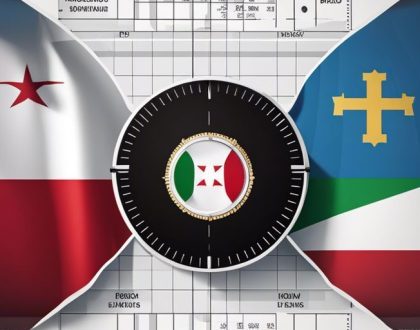Impact of Brexit on Maltese Taxation

In the wake of Brexit, Malta has been faced with significant changes in its tax policies and regulations. The complex dynamics of the Brexit deal have had far-reaching consequences on the taxation system in Malta, impacting both individuals and businesses. It is imperative for individuals and entities operating in Malta to stay informed about the potential risks and opportunities arising from these changes in order to effectively navigate the new tax landscape. In this blog post, we will explore the critical impact of Brexit on Maltese taxation and provide insights into how to adapt to these changes.
The Immediate Effects of Brexit on Maltese Taxation
The withdrawal of the United Kingdom from the European Union, also known as Brexit, has had immediate effects on Maltese taxation. The changes in VAT and custom duties, as well as the impact on direct taxation, have been significant and have required adjustments in Malta’s tax policies and regulations.
Changes in VAT and Custom Duties
Effects on VAT and custom duties have been felt in Malta following Brexit. With the UK no longer being part of the EU, there have been changes in the application of VAT rules for transactions involving the UK. Additionally, custom duties now apply to goods imported from the UK, impacting businesses and consumers in Malta.
Impact on Direct Taxation
To address the impact on direct taxation due to Brexit, Malta has had to review its double taxation treaties and transfer pricing regulations. The changes in the tax treatment of cross-border transactions with the UK have required careful consideration and adjustments to ensure compliance and minimize tax implications for businesses and individuals in Malta.
This significant shift in the tax landscape has created challenges for tax advisors, businesses, and individuals in Malta, requiring them to stay informed and adapt to the new tax consequences of Brexit. It is crucial for all stakeholders to seek professional guidance to navigate these changes effectively.
Long-term Economic Implications
Obviously, the long-term economic implications of Brexit on Maltese taxation are a matter of great concern and scrutiny. As Malta has close economic ties with the UK, any changes in the economic landscape resulting from Brexit will inevitably affect the country’s taxation policies and financial sectors.
Investment Flows
On the front of investment flows, Brexit may lead to a shift in the pattern of foreign direct investment (FDI) into Malta. The uncertainty surrounding the future trade relationship between the UK and the EU could potentially drive investors to reconsider their investment strategies. As a result, Malta might experience a redirection of investment flows from the UK to other European countries, impacting various sectors of the Maltese economy.
Additionally, the loss of unfettered access to the UK market as a gateway to the EU could affect the attractiveness of Malta as a destination for British companies seeking an EU base.
Corporate Taxation and Financial Services
For corporate taxation and financial services, Brexit could lead to changes in the taxation and regulatory framework governing the financial services sector in Malta. Given the interconnectedness of the Maltese financial industry with the UK, alterations in cross-border trade rules and financial regulations could have a significant impact on Malta’s financial services industry.
Moreover, the potential reconfiguration of trade and financial relationships between the UK and the EU might necessitate adjustments to Malta’s tax policies to remain competitive in attracting and retaining multinational corporations.
Investment in the financial services sector will be crucial for Malta’s economic resilience in the face of Brexit. This will require a proactive approach in re-evaluating and potentially revising taxation and regulatory policies to adapt to the new post-Brexit landscape, and to continue attracting foreign investment and ensuring sustainable economic growth.
Legal and Regulatory Adjustments
Not surprisingly, Brexit has necessitated several legal and regulatory adjustments in Malta, particularly in the realm of taxation. These adjustments are crucial to ensure that the country’s tax system remains robust and aligned with international standards, while also adapting to the new post-Brexit landscape.
Modifications in Bilateral Treaties
Adjustments in bilateral tax treaties between Malta and the United Kingdom have been a key focus in the aftermath of Brexit. As the UK moves away from its previous tax arrangements with the EU, Malta has had to renegotiate and amend its existing tax treaties with the UK to reflect the new dynamics. This has been a challenging process, as both countries seek to protect their respective interests while also maintaining a mutually beneficial tax relationship.
Compliance with EU Directives
Any changes in EU tax directives post-Brexit have required Malta to reassess its tax framework to ensure continued compliance with EU standards. This includes revisiting regulations related to areas such as cross-border transactions, anti-tax avoidance measures, and transfer pricing guidelines. Malta’s commitment to meeting EU tax directives remains unwavering, and the necessary adjustments are being made to ensure seamless adherence to EU tax regulations.
This proactive approach underscores Malta’s dedication to upholding international tax standards and fostering a stable tax environment, even in the face of significant geopolitical shifts. The country’s agility in adapting to these changes is a testament to its commitment to maintaining its standing as a reputable jurisdiction for tax planning and compliance.
Adaptive Strategies for Maltese Businesses
After the UK’s decision to leave the European Union, many Maltese businesses have been facing uncertainty and challenges. It is crucial for companies to adapt and implement strategies to navigate the changing landscape and mitigate the potential impact of Brexit on Maltese taxation.
Tax Planning and Structuring
With the changes brought about by Brexit, Maltese businesses need to carefully review their tax planning and structuring. Adapting to the new tax regulations and potential implications of Brexit is essential to minimize tax liabilities and optimize financial efficiency. Companies should consider restructuring their operations and supply chains to strategically position themselves for tax advantages and mitigate any adverse tax consequences arising from Brexit.
Seeking New Markets and Partnerships
Planning for diversification of markets and seeking new partnerships is crucial for Maltese businesses in the post-Brexit era. Expanding into new territories outside the UK and forming partnerships with businesses in other EU member states can help mitigate the potential negative impact of Brexit on trade and access to markets. Additionally, establishing alliances with businesses in non-EU countries can open up new opportunities and reduce reliance on the UK market.
Plus, businesses should consider leveraging Malta’s competitive advantages, such as its attractive tax incentives and strategic location, to attract foreign investments and foster international partnerships.
To wrap up
The impact of Brexit on Maltese taxation has been significant, with changes in the trade environment, increased regulatory complexities, and potential shifts in business dynamics. It is crucial for businesses and individuals in Malta to stay informed about these changes and to plan strategically in order to navigate the new tax landscape effectively. As Brexit continues to unfold, proactive adaptation and thorough understanding of the evolving tax implications are essential for maintaining financial stability and optimizing tax strategies in Malta.
FAQs:
How has Brexit affected VAT and custom duties in Malta?
Brexit has led to changes in the application of VAT rules for transactions involving the UK, and custom duties now apply to goods imported from the UK.
What adjustments has Malta made to address the impact on direct taxation due to Brexit?
Malta has reviewed its double taxation treaties and transfer pricing regulations to ensure compliance and minimize tax implications for businesses and individuals.
What are the long-term economic implications of Brexit on Maltese taxation?
The long-term economic implications include potential shifts in foreign direct investment patterns, changes in corporate taxation and financial services, and alterations in the legal and regulatory framework.
How is Malta adapting its tax treaties with the UK post-Brexit?
Malta is renegotiating and amending its existing tax treaties with the UK to reflect the new dynamics and protect mutual interests while maintaining a beneficial tax relationship.
What adaptive strategies are recommended for Maltese businesses post-Brexit?
Businesses are advised to review tax planning and structuring, explore new markets and partnerships, and leverage Malta’s competitive advantages to mitigate the impact of Brexit on taxation.
Recommended Posts

Malta’s Role in International Financial Regulation
July 23, 2024

Financial Planning and Tax Strategies in Malta
July 22, 2024

Financial Compliance and Regulation in Malta
July 18, 2024




